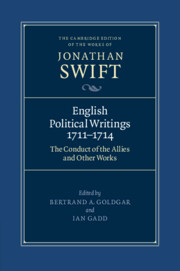Book contents
- Frontmatter
- Contents
- List of Illustrations
- General Editors’ Preface
- Acknowledgements
- Chronology
- List of Abbreviations
- Note
- Introduction
- The Conduct of the Allies
- Some Advice Humbly Offer’d to the Members of the October Club
- Some Remarks on the Barrier Treaty
- The New Way of Selling Places at Court
- Some Reasons to Prove . . . In a Letter to a Whig-Lord
- It’s Out at Last: Or, French Correspondence Clear as the Sun
- A Dialogue Upon Dunkirk, Between a Whig and a Tory
- A Hue and Cry After Dismal
- A Letter From the Pretender, to a Whig-Lord
- A Defence of Erasmus Lewis, or The Examiner (2 February 1713)
- Vote of Thanks by the House of Lords (9 April 1713) and The Humble Address of the . . . Lords (11 April 1713)
- The Importance of the Guardian Considered
- The Publick Spirit of the Whigs
- A Discourse Concerning the Fears From the Pretender
- Some Free Thoughts Upon the Present State of Affairs
- Some Considerations Upon the Consequences Hoped and Feared from the Death of the Queen
- Contributions to the Post Boy and the Evening Post
- Textual Introduction and Accounts of Individual Works
- Textual Introduction Ian Gadd
- The Conduct of the Allies: Textual Account
- Appendix: Transcripts of the British Library Manuscripts of the Vote of Thanks and The Humble Address of . . . the Lords
- Bibliography
- Index
The New Way of Selling Places at Court
Published online by Cambridge University Press: 02 September 2021
- Frontmatter
- Contents
- List of Illustrations
- General Editors’ Preface
- Acknowledgements
- Chronology
- List of Abbreviations
- Note
- Introduction
- The Conduct of the Allies
- Some Advice Humbly Offer’d to the Members of the October Club
- Some Remarks on the Barrier Treaty
- The New Way of Selling Places at Court
- Some Reasons to Prove . . . In a Letter to a Whig-Lord
- It’s Out at Last: Or, French Correspondence Clear as the Sun
- A Dialogue Upon Dunkirk, Between a Whig and a Tory
- A Hue and Cry After Dismal
- A Letter From the Pretender, to a Whig-Lord
- A Defence of Erasmus Lewis, or The Examiner (2 February 1713)
- Vote of Thanks by the House of Lords (9 April 1713) and The Humble Address of the . . . Lords (11 April 1713)
- The Importance of the Guardian Considered
- The Publick Spirit of the Whigs
- A Discourse Concerning the Fears From the Pretender
- Some Free Thoughts Upon the Present State of Affairs
- Some Considerations Upon the Consequences Hoped and Feared from the Death of the Queen
- Contributions to the Post Boy and the Evening Post
- Textual Introduction and Accounts of Individual Works
- Textual Introduction Ian Gadd
- The Conduct of the Allies: Textual Account
- Appendix: Transcripts of the British Library Manuscripts of the Vote of Thanks and The Humble Address of . . . the Lords
- Bibliography
- Index
Summary
A LETTER FROM A SMALL COURTIER TO A GREAT STOCK-JOBBER
SIR,
In that friendly Dispute which happen’d between us some time ago, wherein you endeavour’d to prove, that the City-Politicks out-did those of the Court, I remember there was nothing upon which you seemed to Pride your self more, than that Mystery of your Brethren in Exchange-Alley, which is usually called, Selling the Bear-Skin; whereby a very beneficial Trade was daily driven with imaginary Stocks, and many Thousands bought and sold, to great Advantage, by those who were not worth a Groat. This you challeng’d me to match, with all my Knowledge, in the lower Arts of the Court. I confess, you had then the better of the Argument, and I was forc’d to yield; which I would hardly do at present, if the Controversie were to be resumed: I could now make you acknowledge, that what you in the City call Selling the Bear-Skin, does not deserve the Name, when compar’d with the Dexterity of one of our Artists. I shall leave the Decision of this Matter to your self, after you have receiv’d the following Story, which I shall most faithfully relate.
There is a certain petty Retainer to the Court, who has no Employment at all himself, but is a Partner for Life to one that has: This Gentleman resides constantly with his Family among us, where being wholly atLeisure, he is consequently very Speculative, perpetually turning his Thoughts to improve those happyTalents thatNature hath given him. He hath maturely consider’d with himself the strange Opinions that People at distance have of Courts: Strangers are apt to think, that whoever hath an Apartment in the Royal Palace, can go through the Lodgings, as if he were at Home, and talk familiarly with every one he meets, must needs have at any time a Dozen or two of Employments in his Power. The leastWord from him to a Great Man, or, upon extraordinary Occasions, to the Q——n Her self, would certainly do the Business. This Ignorance hath often been made very good use of by dextrous Men among us. Old Courtiers will tell you Twenty Stories of Harry Killigrew, Fleet. Shepherd, and others, who would often sell Places that were never in Being, and dispose of others a good Pennyworth before they were Vacant.
- Type
- Chapter
- Information
- English Political Writings 1711–1714'The Conduct of the Allies' and Other Works, pp. 155 - 162Publisher: Cambridge University PressPrint publication year: 2008

